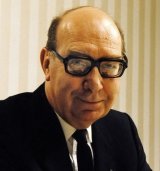Analysis of The Whitsun Weddings
Philip Larkin 1922 (Coventry) – 1985 (Hull)
That Whitsun, I was late getting away:
Not till about
One-twenty on the sunlit Saturday
Did my three-quarters-empty train pull out,
All windows down, all cushions hot, all sense
Of being in a hurry gone. We ran
Behind the backs of houses, crossed a street
Of blinding windscreens, smelt the fish-dock; thence
The river’s level drifting breadth began,
Where sky and Lincolnshire and water meet.
All afternoon, through the tall heat that slept
For miles inland,
A slow and stopping curve southwards we kept.
Wide farms went by, short-shadowed cattle, and
Canals with floatings of industrial froth;
A hothouse flashed uniquely: hedges dipped
And rose: and now and then a smell of grass
Displaced the reek of buttoned carriage-cloth
Until the next town, new and nondescript,
Approached with acres of dismantled cars.
At first, I didn’t notice what a noise
The weddings made
Each station that we stopped at: sun destroys
The interest of what’s happening in the shade,
And down the long cool platforms whoops and skirls
I took for porters larking with the mails,
And went on reading. Once we started, though,
We passed them, grinning and pomaded, girls
In parodies of fashion, heels and veils,
All posed irresolutely, watching us go,
As if out on the end of an event
Waving goodbye
To something that survived it. Struck, I leant
More promptly out next time, more curiously,
And saw it all again in different terms:
The fathers with broad belts under their suits
And seamy foreheads; mothers loud and fat;
An uncle shouting smut; and then the perms,
The nylon gloves and jewellery-substitutes,
The lemons, mauves, and olive-ochres that
Marked off the girls unreally from the rest.
Yes, from cafés
And banquet-halls up yards, and bunting-dressed
Coach-party annexes, the wedding-days
Were coming to an end. All down the line
Fresh couples climbed aboard: the rest stood round;
The last confetti and advice were thrown,
And, as we moved, each face seemed to define
Just what it saw departing: children frowned
At something dull; fathers had never known
Success so huge and wholly farcical;
The women shared
The secret like a happy funeral;
While girls, gripping their handbags tighter, stared
At a religious wounding. Free at last,
And loaded with the sum of all they saw,
We hurried towards London, shuffling gouts of steam.
Now fields were building-plots, and poplars cast
Long shadows over major roads, and for
Some fifty minutes, that in time would seem
Just long enough to settle hats and say
"I nearly died,"
A dozen marriages got under way.
They watched the landscape, sitting side by side
—An Odeon went past, a cooling tower,
And someone running up to bowl—and none
Thought of the others they would never meet
Or how their lives would all contain this hour.
I thought of London spread out in the sun,
Its postal districts packed like squares of wheat:
There we were aimed. And as we raced across
Bright knots of rail
Past standing Pullmans, walls of blackened moss
Came close, and it was nearly done, this frail
Travelling coincidence; and what it held
Stood ready to be loosed with all the power
That being changed can give. We slowed again,
And as the tightened brakes took hold, there swelled
A sense of falling, like an arrow-shower
Sent out of sight, somewhere becoming rain.
| Scheme | ABCBDEFDEF GXGXHIXHIX JKJKDLMXLM XXXCXNODNO PXPXQRSQRS TUTUVXWVXW AXAXYZFYZF 1 2 1 2 3 YX3 YX |
|---|---|
| Poetic Form | Tetractys (30%) |
| Metre | 111111001 1101 110101100 1111010111 1101110111 1100010111 0101110101 110110111 0101010101 110100101 101101111 111 010101111 1111110100 0111101001 011010101 0101010111 0101110101 0101110101 0111010101 111110101 0101 1101111101 01010100001 010111101 111101101 0111011101 11110011 0100110101 1111011 1111011101 101 11010111110 11011111000 01110101001 0101111011 010110101 1101010101 0110110 010101011 11011101 1111 0101110101 110100101 0101111101 1101010111 0101000101 0111111101 1111010101 1101101101 0111010100 0101 0101010100 111011101 1001010111 0101011111 110011010111 110101011 111010101 1101010111 1101110101 1101 0101001101 110110111 11001101010 011011101 1101011101 11111101110 1111011001 1101011111 1101011101 1111 110111101 1101110111 10001000111 11011111010 1101111101 0101011111 01110111010 111110101 |
| Closest metre | Iambic pentameter |
| Characters | 3,380 |
| Words | 558 |
| Sentences | 15 |
| Stanzas | 8 |
| Stanza Lengths | 10, 10, 10, 10, 10, 10, 10, 10 |
| Lines Amount | 80 |
| Letters per line (avg) | 33 |
| Words per line (avg) | 7 |
| Letters per stanza (avg) | 328 |
| Words per stanza (avg) | 70 |
Font size:
Citation
Use the citation below to add this poem analysis to your bibliography:
Style:MLAChicagoAPA
"The Whitsun Weddings" Poetry.com. STANDS4 LLC, 2024. Web. 3 May 2024. <https://www.poetry.com/poem-analysis/53681/the-whitsun-weddings>.


Discuss this Philip Larkin poem analysis with the community:
Report Comment
We're doing our best to make sure our content is useful, accurate and safe.
If by any chance you spot an inappropriate comment while navigating through our website please use this form to let us know, and we'll take care of it shortly.
Attachment
You need to be logged in to favorite.
Log In